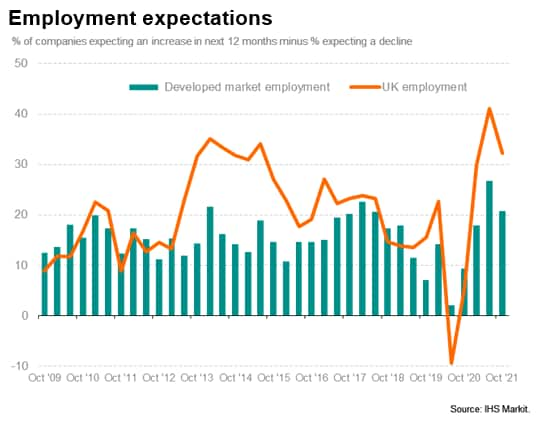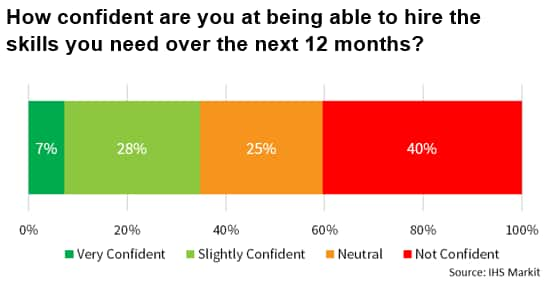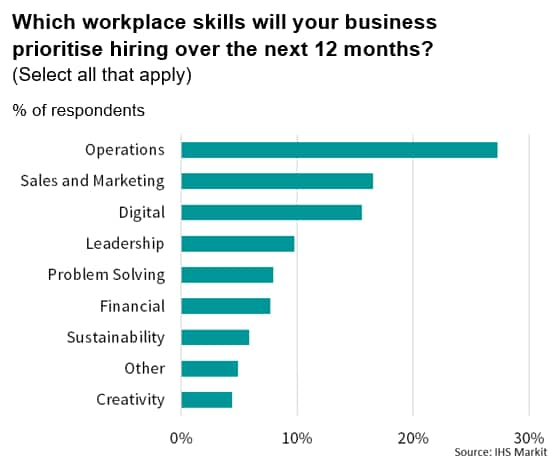UK firms plan marked increase in employment, but only a third of businesses report confidence about hiring skilled staff
Hiring intentions weaken from June's record high but remain strong
Firms anticipate challenges recruiting skilled staff as labour shortages run high
Operations tops the list of prioritised workplace skills
Projections for UK employment levels were upbeat again in October as firms look to ease labour shortages seen across vast areas of the economy. That said, the overall level of hiring expectations slipped from a 12-year survey-record high in June, while firms also signalled that a mismatch of skills was likely to present recruitment challenges over the coming year.
Latest data from the Accenture/IHS Markit UK Business Outlook survey - a tri-annual survey based on a panel of around 1,300 companies in the manufacturing and services sectors - showed a robust level of confidence among UK businesses regarding hiring over the coming 12 months.
Barring the record high seen in the previous survey in June (+41%), the net balance of companies expecting an increase in staffing (+32%) was the highest since June 2015. This was also the second-strongest out of the countries monitored by the Business Outlook survey, with Ireland the only nation to report higher expectations for employment growth in October.
Businesses often commented on a need to resolve labour shortages since the end of lockdown, and some highlighted recruitment difficulties as a long-term term risk to the recovery. Reduced staff availability was cited across many sectors, especially manufacturing, hospitality and transport services.
Some 40% of firms lacked confidence that they would be able to find skilled workers for vital roles within their organisation. October data showed that only 35% of survey respondents were confident that they could recruit skilled staff during the year ahead, with most of these firms replying they were 'Slightly Confident' (28%) instead of 'Very Confident' (7%).
With 40% of UK companies reporting that they were 'Not Confident' of finding the staff they required, the survey suggests that a changing business landscape has led to a mismatch of skills across many sectors, likely linked to the pandemic and Brexit.
Firms were particularly downbeat about their ability to hire experienced staff over the next 12 months in October, with only 29% reporting confidence. By comparison, 47% of firms were confident that they could hire entry-level staff. Optimism towards hiring senior management was also in short supply, with only 40% of companies indicating confidence.
Surveyed companies were also asked to pinpoint workplace skills that they would prioritise hiring over the coming year. Top of the list was Operations (27%), reflecting efforts among firms to redesign their supply chains and build resilience to global supply disruption.
Sales & Marketing (17%) and Digital (16%) were also prominent areas of hiring, as firms hope to recover demand and adapt to the rapid pace of technological change ushered in by the pandemic.
David Owen, Economist, IHS Markit
Tel: +44 2070 646 237
david.owen@ihsmarkit.com
© 2021, IHS Markit Inc. All rights reserved. Reproduction in whole
or in part without permission is prohibited.
Purchasing Managers' Index™ (PMI™) data are compiled by IHS Markit for more than 40 economies worldwide. The monthly data are derived from surveys of senior executives at private sector companies, and are available only via subscription. The PMI dataset features a headline number, which indicates the overall health of an economy, and sub-indices, which provide insights into other key economic drivers such as GDP, inflation, exports, capacity utilization, employment and inventories. The PMI data are used by financial and corporate professionals to better understand where economies and markets are headed, and to uncover opportunities.
This article was published by S&P Global Market Intelligence and not by S&P Global Ratings, which is a separately managed division of S&P Global.



